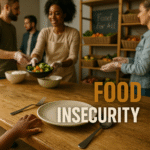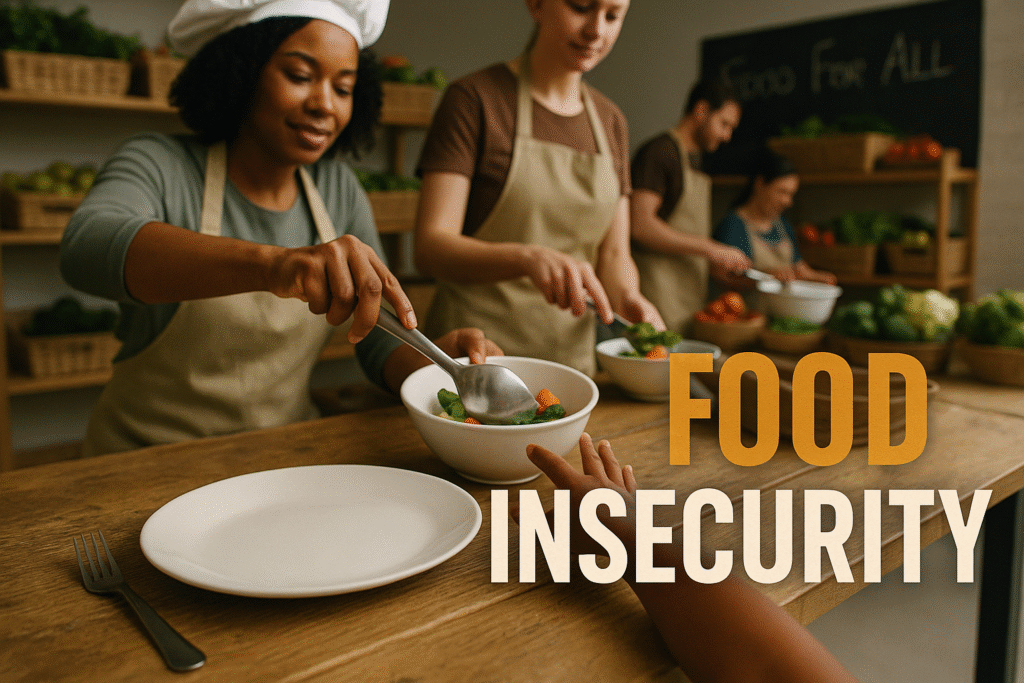

Ending Food Insecurity in New Jersey
By Darius Spearman (africanelements)
Support African Elements at patreon.com/africanelements and hear recent news in a single playlist. Additionally, you can gain early access to ad-free video content.
Understanding Food Insecurity
Food insecurity is a significant challenge in New Jersey, impacting many families and communities. It refers to the lack of consistent access to enough food for an active, healthy life for all household members (KIDS COUNT Data Center). This means that individuals may experience limited or uncertain availability of nutritionally adequate foods (KIDS COUNT Data Center). It is important to note that food insecurity is not always a constant state; households may experience it at different times (KIDS COUNT Data Center). Furthermore, food-insecure households often face difficult choices, having to prioritize essential needs like housing or medical bills over purchasing sufficient, nutritious food (KIDS COUNT Data Center).
The root causes of food insecurity are deeply intertwined with socioeconomic factors. Low household income and individual-level poverty are strongly linked to higher rates of food insecurity, particularly among children (academic.oup.com). Living in areas with high deprivation and lacking health insurance can also contribute to this issue (academic.oup.com). As of June 2022, more than 760,000 New Jersey residents lacked sufficient food and proper nutrition (nj.com). This widespread issue highlights the urgent need for comprehensive solutions that address both immediate food needs and the underlying causes of insecurity.
What is Food Insecurity?
Food Insecurity: The lack of consistent access to enough food for an active, healthy life for all household members. This can mean limited or uncertain availability of nutritionally adequate foods. Households experiencing food insecurity may not be food insecure all the time, and they might have to choose between essential needs like housing or medical bills and purchasing sufficient, nutritious food.
Addressing Food Apartheid
The concept of “food deserts” has been used to describe areas with limited access to fresh, affordable, and healthy food. However, some advocates, like Chef Sean Hassan, prefer the term “food apartheid” (afro.com). This term highlights that the restriction of food in certain neighborhoods is not merely a natural occurrence, but rather a result of systemic racial and economic inequalities (afro.com). Food apartheid emphasizes the deliberate and historical policies that have created these disparities, leading to a lack of access to healthy food options in predominantly Black and brown communities.
Specific barriers to accessing healthy food in these areas include limited availability of grocery stores, lack of reliable transportation to stores outside the neighborhood, and the high cost of fresh produce compared to processed foods. Chef Alexandra Charles, who has personally experienced a lack of access to healthy and nourishing foods, actively supports food insecurity efforts and stresses the importance of partnering with community centers to overcome these barriers (afro.com). By working directly within affected communities, organizations can better understand and address the unique challenges faced by residents, ensuring that solutions are tailored and effective.
Dignity in Hunger Relief
Many organizations in New Jersey are transforming hunger relief from a traditional “emergency food” model to one that prioritizes dignity and respect (mendnj.org). Providing food with dignity means more than just handing out meals; it involves creating an environment where individuals feel valued and empowered. For example, Toni's Kitchen, a soup kitchen in Montclair, provides hot, nutritious meals in a restaurant-style setting, emphasizing dignity, health improvement, and fostering independence (toniskitchen.org, toniskitchen.org). This approach allows patrons to choose their meals, sit at tables, and experience a sense of normalcy and respect.
Furthermore, organizations like MEND (Meeting Essential Needs with Dignity) Hunger Relief Network of Essex County focus on sourcing high-quality, culturally relevant, fresh, and healthy food (mendnj.org). Culturally relevant food means providing options that align with the dietary preferences and traditions of the diverse communities they serve. This approach acknowledges and respects the cultural heritage of individuals, making the food more appealing and ensuring that it is consumed. By prioritizing the needs of their patrons and offering a variety of familiar and nutritious options, these organizations are not only addressing hunger but also promoting overall well-being and cultural sensitivity.
Collaborative Community Efforts
Collaborative efforts and community engagement are crucial in addressing food insecurity and promoting health equity. Health equity means that everyone has a fair and just opportunity to be as healthy as possible, regardless of their socioeconomic status, race, or other circumstances. The “Nourishing Communities, Confronting Food Insecurity Together” program at NJPAC brought together local chefs, health leaders, and community advocates to confront food insecurity and inequities (afro.com). This event highlighted the healing power of connection, with nonprofits like Toni's Kitchen sharing resources directly with attendees (afro.com).
MEND launched the Food & Health Equity Coalition of Essex County in 2024 to identify and address the greatest barriers to food and health equity across Essex County (mendnj.org). Over 80 people from more than 50 organizations participated in the launch, demonstrating a collective effort to identify barriers to food security (mendnj.org). This coalition aims to share existing assets and resources for greater collaborative and collective impact (mendnj.org). Strong institutions coming together and voicing their concerns is a powerful way to move things forward in addressing systemic change (afro.com). These collaborations allow for a more holistic approach, combining diverse expertise and resources to tackle complex issues.
New Jersey Food Insecurity Statistics
Funding and Support for Hunger Relief
Community organizations rely heavily on public support through volunteering and donations to continue their vital work in combating hunger. Individuals can significantly help fight hunger and food insecurity in New Jersey by volunteering their time at organizations like Toni's Kitchen or by donating food or money (toniskitchen.org). Volunteers play a crucial role in various aspects of hunger relief, from preparing and serving meals to organizing food drives and assisting with administrative tasks. Their dedication ensures that operations run smoothly and that food reaches those who need it most.
Financial contributions are equally important, as they provide the necessary resources for organizations to purchase food, maintain facilities, and expand their programs. Interfaith Neighbors is seeking support from the broader community to sponsor the cost of produce for individual families, with $250 underwriting the cost for a family for the growing season and $50 supporting a family's produce for one month (interfaithneighbors.org). These donations directly translate into access to fresh, healthy food for families who might otherwise struggle to afford it. MEND also received Grant Navigator Support, which helps unlock additional funding opportunities to strengthen community health by increasing access to fresh and healthy food (mendnj.org). This support is crucial for organizations to secure the long-term funding needed to sustain and grow their impactful initiatives.
Policy and Systemic Change
Addressing food insecurity structurally requires significant policy and systemic changes. The Supplemental Nutrition Assistance Program (SNAP) has been a central focus in these efforts, often debated as either a critical tool for poverty reduction or a costly government expense (news-journal.com). Historically, both Republican and Democratic administrations have expanded or contracted SNAP, reflecting a complex balance between fiscal and social responsibility (news-journal.com). For instance, the Reagan administration implemented cuts to food assistance programs, while the Clinton administration imposed stricter work requirements for SNAP recipients (news-journal.com).
Conversely, the George W. Bush administration expanded access to SNAP, and the Obama administration significantly increased benefits during the Great Recession (news-journal.com). These shifts highlight the dynamic nature of policy decisions and their direct impact on food security. Current policy initiatives often focus on expanding access to nutritious food, improving food distribution networks, and addressing the underlying socioeconomic factors that contribute to food insecurity. Advocacy groups and community organizations continue to push for policies that ensure all residents have reliable access to healthy food, recognizing that systemic change is essential for long-term solutions.
SNAP Policy Changes Over Time
Impact and Future Directions
The efforts of organizations like Toni's Kitchen, MEND, and Interfaith Neighbors are making a tangible difference in the lives of New Jersey residents. Food pantries such as the Human Needs Food Pantry and the New Jersey Community Food Bank offer free, nutritious, healthy food to Essex County and New Jersey residents who cannot afford fresh groceries (toniskitchen.org). These direct services provide immediate relief and ensure that families have access to essential nourishment. The success stories, like individuals securing employment and then wanting to give back, underscore the profound impact of these programs on individual lives and the broader community (afro.com).
Looking ahead, the focus remains on strengthening community health by increasing access to fresh and healthy food, envisioning a community where everyone has access to nutritious food and the ability to achieve optimal health (mendnj.org). This includes continued collaboration among organizations, advocacy for supportive policies, and sustained community engagement. By addressing the root causes of food insecurity, promoting dignity in food distribution, and fostering strong partnerships, New Jersey can move closer to a future where hunger is eradicated and health equity is a reality for all its residents. The ongoing commitment of these organizations, supported by community involvement, is essential for achieving these ambitious but critical goals.
Impact of Hunger Relief Efforts
ABOUT THE AUTHOR
Darius Spearman has been a professor of Black Studies at San Diego City College since 2007. He is the author of several books, including Between The Color Lines: A History of African Americans on the California Frontier Through 1890. You can visit Darius online at africanelements.org.
